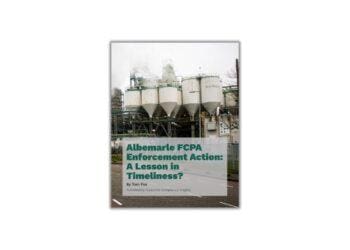Corporate Criminal Liability for Bribery in Asia-Pacific
While individual employees and company representatives are responsible for acts of bribery in the majority of cases, the trend in Asia-Pacific countries is toward greater scrutiny of corporations.
with co-authors Jenni Hill, Lei Shi, Janice Goh, Tess Forge and Akanksha Bhagat
Prosecutors, legislators and regulators in Asia-Pacific are increasingly rejecting the view that companies cannot be held responsible for the acts of their employees, particularly for bribes paid to obtain benefits for their companies. Eyeing the deterrent impact, as well as the generous corporate penalties and fines available in other jurisdictions, Asia-Pacific countries are joining the general trend toward prosecuting corporate entities for the criminal misconduct of their officers and employees.
Hong Kong
Hong Kong’s anti-bribery and corruption legislation, the Prevention of Bribery Ordinance (POBO), has no specifically drafted corporate offence. While it is theoretically possible that a corporation might be found liable under the POBO (by virtue of the broad definition of “person” used within the POBO to include a corporate entity), this would involve the use of the common law identification/directing mind principle, which is notoriously difficult to prove. In essence, the prosecution would need to prove that an individual was sufficiently senior within a corporation so that it could be said that they were, in effect, one and the same. This has never occurred in Hong Kong for an offense under the POBO.
Singapore
The Singapore Prevention of Corruption Act (PCA) defines “person” to include any company or association or body of persons, corporate or unincorporated. Corporate liability would most likely be triggered under the PCA if the offending employee was acting in the course of business and was in control of the company’s affairs to the degree the company was acting or thinking through that employee (the “identification principle”). In practice, corporate prosecutions for bribery have been rare. However, this may change with the recent introduction of deferred prosecution agreements (DPAs) in Singapore legislation. DPAs would only be available to corporate offenders, which suggests that Singapore may be increasing its focus and criminal enforcement efforts against corporate entities and in corporate criminal liability.
Australia
Currently, in Australia, a corporate entity may be convicted of bribery by vicarious liability or by attribution to it of the state of mind of an employee or agent. However, legislation has been introduced adding a new corporate offence of failure by a body corporate to prevent bribery by an associate. Moreover, there has also been a proposal to change corporate misconduct legislation and to introduce significantly increased criminal and civil penalties.
Mainland China
In the PRC, a corporate entity may be held liable only for crimes that specifically provide for corporate criminal liability. Such crimes are considered “entity offences” under Article 30 of the Criminal Law, including certain bribery-related offenses such as giving and accepting bribes. Corporate offenders are subject to criminal fines and confiscation of illegal profits, and the relevant management personnel who are directly responsible for the entity and/or the relevant criminal offence may be subject to penalties such as criminal detention or imprisonment. Moreover, under the Anti-Unfair Competition Law and the applicable regulations, an employer is vicariously liable for commercial bribes offered or accepted by its employees for the purpose of securing transaction opportunities or competitive advantages for the employer.
Japan
Under the Japanese Criminal Code, there is no provision for corporate liability. However, there are specific regulations under the Unfair Competition Prevention Act that make corporate criminal liability possible if the company has some involvement in the bribery.
Malaysia
Malaysia has amended its Malaysian Anti-Corruption Commission Act, making corporations liable for the corrupt practices of associated persons, including employees. The amendments share various similarities to the U.K. Bribery Act, imposing criminal liability on Malaysian companies and companies doing business in Malaysia if their directors or employees corruptly give gratifications with intent to obtain or retain business, or an advantage in the conduct of business, for the corporation. To avoid liability, the organisation must demonstrate that adequate procedures to prevent corruption practices were in place. The amendments have been gazetted in May 2018, but have not been brought into force, and corporations have two years from that date to put such procedures in place.
Indonesia
While Indonesia’s Criminal Code does not cover corporate criminal liability unless it is provided for by a specific law, the Anti-Corruption Law states that a corporation may be held liable for bribery if the bribery is committed by individuals based on an employment relationship or other relationship, acting individually or together, in such company’s environment.
India
India’s Prevention of Corruption Act was amended in July 2018, establishing corporate criminal liability under Indian law. Pursuant to the amendments, a commercial organisation is liable for a fine where any person associated with the organisation promises or gives an undue advantage to a public servant with the intention of obtaining or retaining business or a business advantage for the commercial organisation. The amendments define “persons” associated with commercial organisations widely, including employees, agents, subsidiaries and third parties. It is a defence for a commercial organisation to show that it had adequate compliance guidelines in place to prevent such bribery.
Cooperation
In many jurisdictions, a corporation can mitigate the consequences of any liability by cooperating with the authorities. It is not surprising that in an era of increasingly scarce resources, prosecutors and regulators are willing to reduce potential penalties in exchange for cooperation by the corporate entity. The signs are that the trend is toward greater, not lesser, scrutiny of corporate entities and their officers by regulators and prosecutors in Asia-Pacific.



 Wendy L. Wysong is a partner at
Wendy L. Wysong is a partner at 






